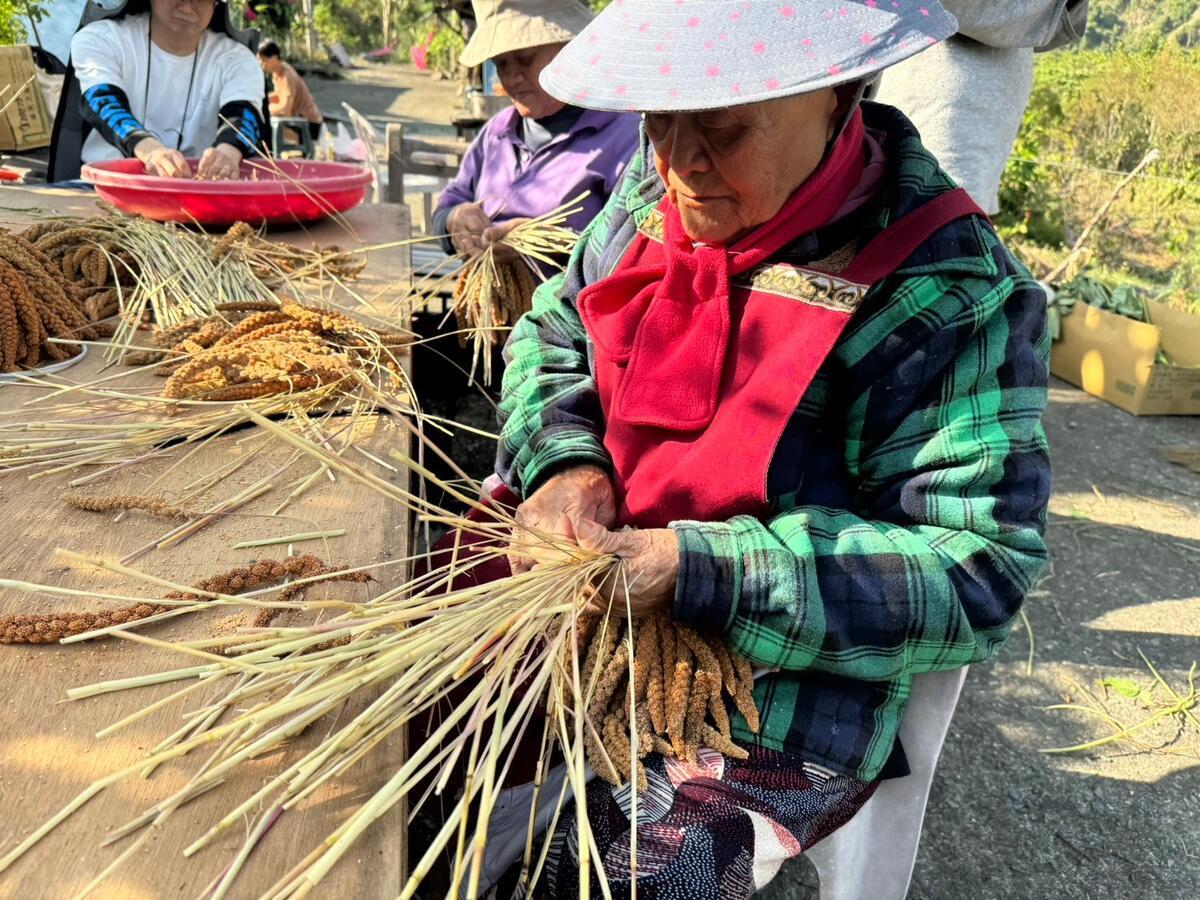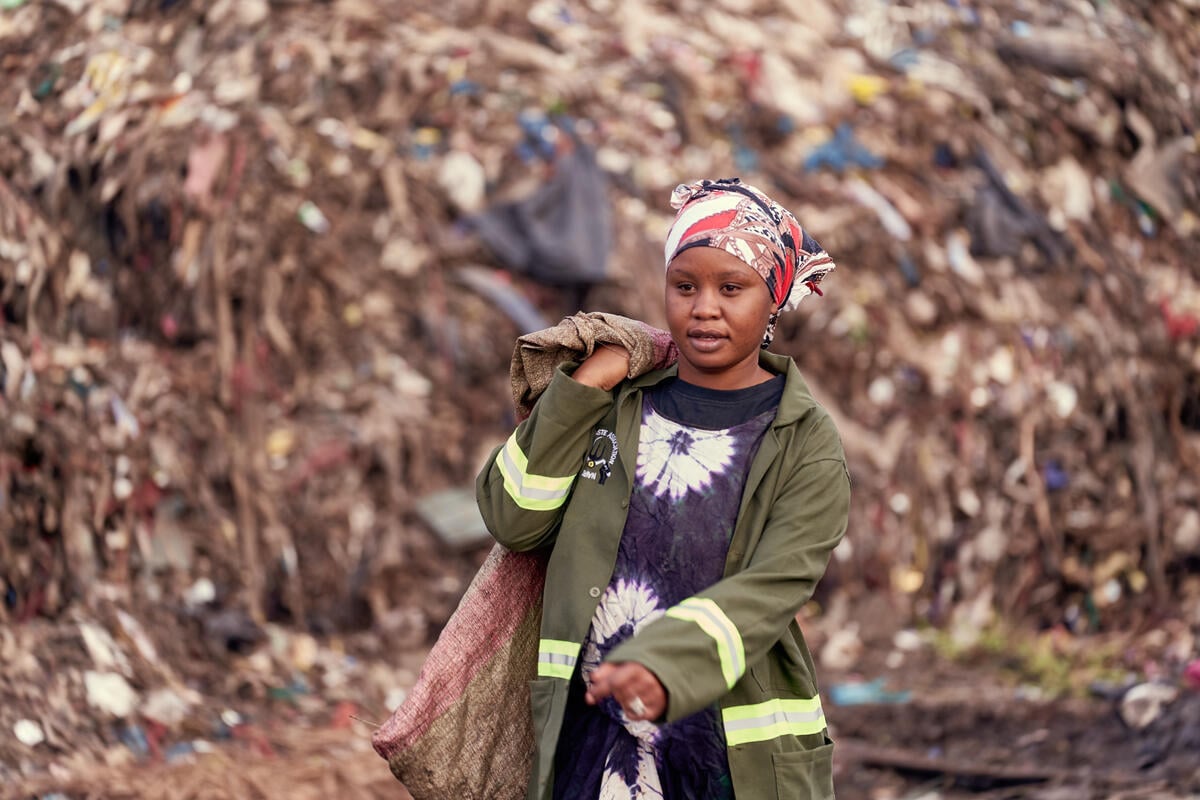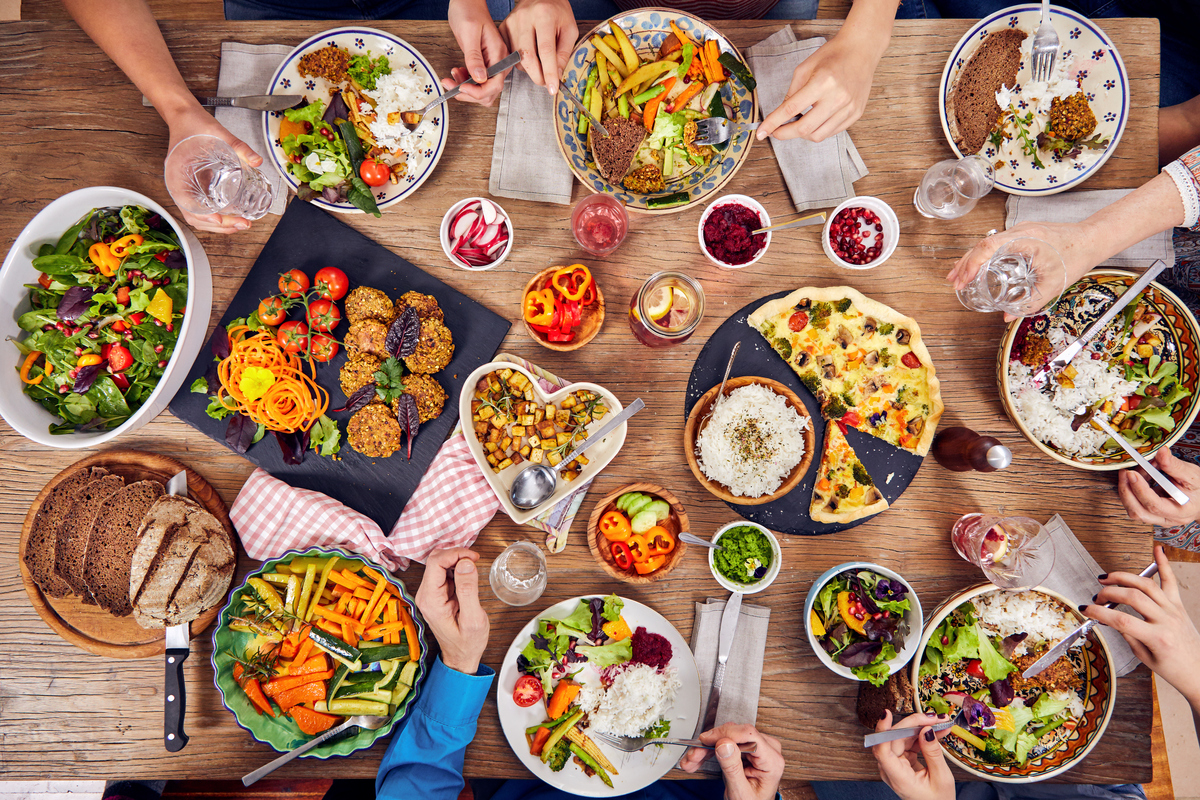
A family eating variety of plant based foods at home.
Walk around any major city and you’re bound to see a trending uptick of vegan cafes. Shiny, bright, minimalist, and inviting these modern vegan cafes and the meals on offer have the power to fool and surprise most people into digging into their colourful and healthy dish and exclaiming “I can’t believe it’s vegan!”.
In fact, the practice of abstaining from animal products has been around for a very long time. But with concerns about climate change, health, animal welfare, and industrial agriculture thrown into the mix, veganism has become a very attractive option for even the hardiest of meat eaters.
But is plant-based eating enough? And is it right for you?
Heather Russell is a vegan dietitian and works for The Vegan Society based in the UK. She helps ease people into taking up more plant-based eating, makes sure that people are getting the right type of nutrients to suit their needs, and is a big fan of beans!
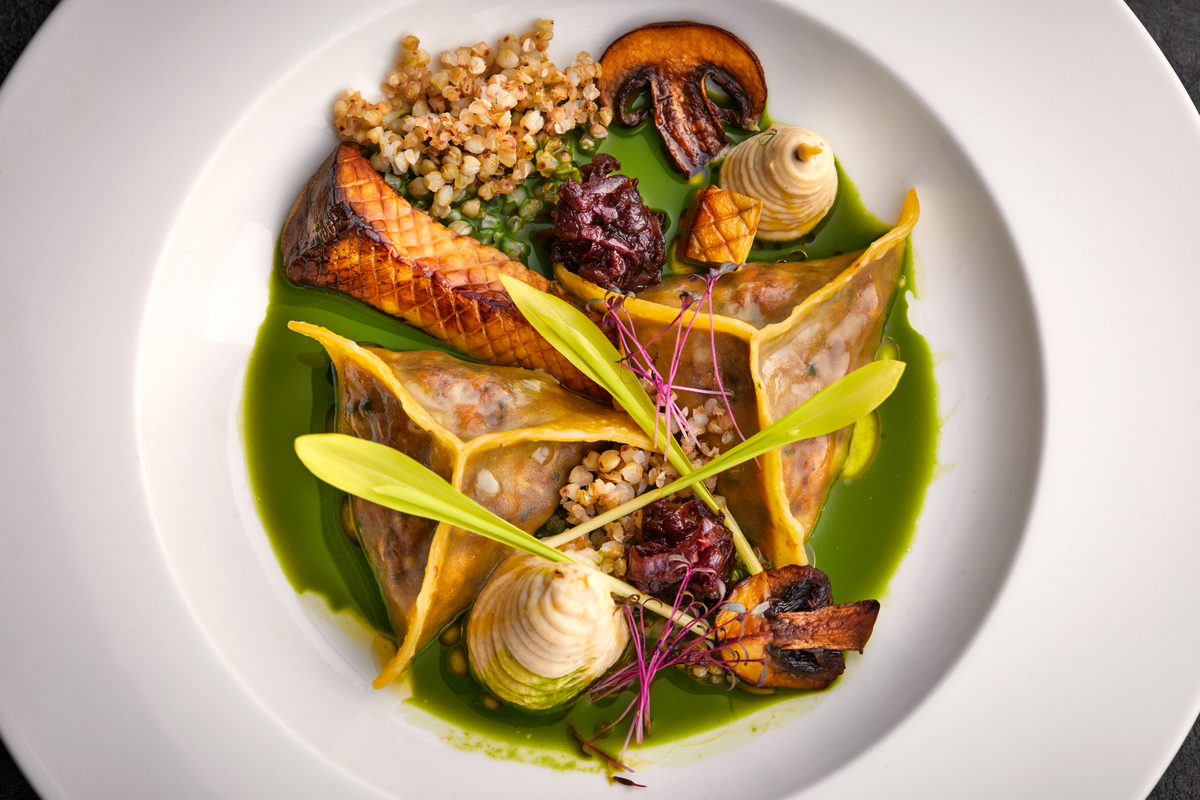
Dried porcini stuffed ravioli in herb sauce with pan roasted mushrooms, buckwheat, red onion jam and celery root puree.
What was your motivation to become vegan? Was it for health reasons, animal rights, or climate change?
I started my vegan journey in 2015 after reading Eating Animals by Jonathan Safran Foer, and found the ethical and environmental benefits of eating a vegan diet equally compelling. I’ve been working for The Vegan Society for over two years now and am in charge of running our nutrition service. I really enjoy it because I get to assist people with their vegan journeys, support the development of plant-based catering, and help other services to meet vegan needs.
You probably encounter a lot of misconceptions regarding plant-based nutrition, like the idea that we can’t get enough just by fruits and vegetables alone. What can someone do to ensure that they are getting what their body needs by eating plant-based foods?
Many people grow up thinking that animal products like meat and milk are essential parts of a healthy diet, but in fact, we can obtain all the nutrients that our bodies need without all of that. Both the British Dietetic Association and the American Academy of Nutrition and Dietetics recognise that well-planned vegan diets can support healthy living in people of all ages.
People are often surprised to find out how easy it is to obtain adequate amounts of protein and calcium from a vegan. Good sources of plant protein include legumes, tofu, peanut butter, cashew nuts, pumpkin seeds and soya dairy alternatives. Calcium-set tofu and calcium-fortified foods are really rich sources of this nutrient. For example, fortified plant-based milk contains pretty much the same amount of calcium as cow’s milk.
Vegans choose not to eat oily fish, so a really rich plant-based source of omega-3 fat should be consumed daily, such as walnuts or ground linseed (flaxseed).
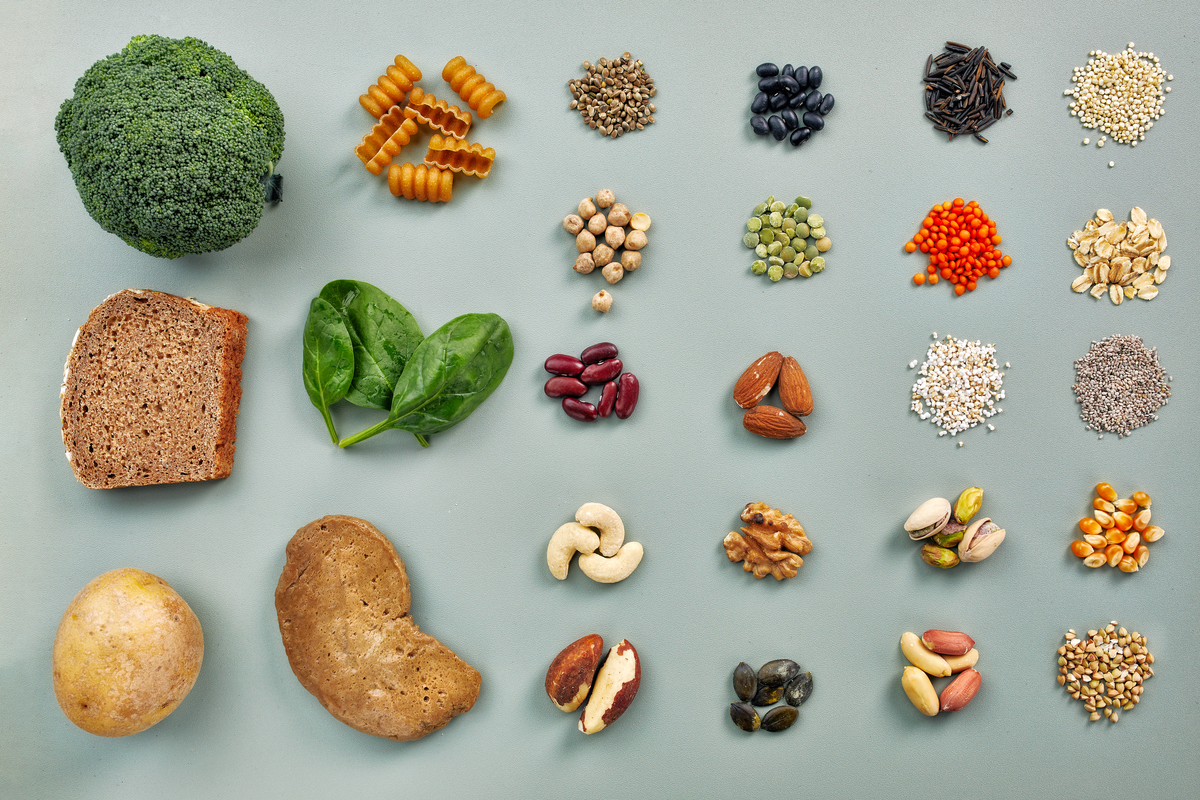
Alternative protein sources include nuts, seeds and vegetables
Are there any supplements or vitamins that are required when it comes to a plant-based diet?
It’s important for anyone who eats few or no animal products to know about the role of supplementation in vegan nutrition. In the UK, vitamin D supplementation is recommended for everyone during autumn and winter as a minimum. It’s essential for vegans to obtain vitamin B12 from fortified foods or supplementation because this nutrient isn’t produced by plants. Generally, plant-based foods contain low amounts of iodine and selenium, although it depends on their growing environments. Anyone eating a dairy-free diet should consider iodine supplementation. Vegans can boost their selenium intakes by eating a couple of Brazil nuts daily or using a supplement.
A lot of people might assume that plant-based foods are automatically healthy. What is your guidance for people trying to navigate vegan junk food from healthy eating? Can processed foods be healthy?
Vegans need to think about healthy eating as much as everyone else. There are many high fat and high sugar items that do not contain animal ingredients, and if these foods feature heavily on your daily menu, they are likely to contribute significantly to your calorie intake, whilst limiting the overall nutritional value of your diet. Also, some vegan-friendly convenience foods contain a lot of salt, which has been linked to high blood pressure.
As a general rule of thumb, you can make the most of a vegan diet by eating plenty of minimally processed and health-promoting plant foods like wholegrains, nuts, fruit and vegetables. However, some more processed foods fit into healthy eating guidelines. For example, fortified plant-based alternatives to milk and yoghurt are valuable sources of calcium and other nutrients, and small amounts of dairy-free spread can provide unsaturated fats.
There’s an idea that a vegan diet is only accessible for those with a better socio-economic background, or that it’s not adaptable to different cultures. What are your thoughts about that and how can we make plant-based eating more accessible to everyone?
These are complex social issues, but vegan diets can be very affordable, particularly if you have access to supermarkets, markets and online retailers. Meat, fish, eggs and dairy won’t be on your shopping list, and overall, getting your nutrients from alternative sources might work out cheaper. For example, legumes (beans, lentils and peas) provide a lot of nutritional bang for your buck, including good quality protein.
In many cultures, it’s common for dishes to be centred around plant foods rather than animal products. However, if you are used to meat, fish, eggs or cheese taking centre stage at mealtimes, it may take a bit more research and creativity to “veganise” your favourite meals. I think that community cooking classes are a great way of bringing people together to enjoy preparing and eating a variety of simple and affordable plant-based meals. Promotion of tasty plant-based food in public canteens and commercial eateries also helps to make it a mainstream choice.
What are your thoughts on the so-called “fake-meat” or lab-grown meat fad?
Clearly, cultured meat has the potential to reduce animal suffering, but if the production of it requires animal products, it’s not a vegan-friendly option. I don’t think of another animal’s flesh as a food item anymore. I’m happy getting a lot of my protein from health-promoting legumes. Unlike meat, they also provide beneficial fibre.

Vegan dessert! Oatmeal chocolate bar, chestnut sauce, black sesame ice cream, red wine roasted plum and whipped coconut cream.
So many popular plant based foods aren’t necessarily grown locally. How do you ensure that the foods you eat are both nutritious and also sustainable?
Generally, the environmental footprint of plant-based foods tends to be lower than animal products. However, there are many things that we can do to make more environmentally conscious choices. It’s helpful to choose seasonal fruit and vegetables and bear in mind that refrigeration, growing produce in heated environments and transporting it from the southern hemisphere are resource-intensive practices. When choosing plant-based milks, you can look at the manufacturers’ sustainability policies. For example, many products on European shelves contain soya grown in Europe.
Based on your experience as a dietitian and current trends, what do you think is the future of the food system and veganism in the next 10 years?
There are a lot of issues within the food system that need to be ironed out. We need to use the resources on our planet in a more sustainable way. Moving away from the high use of animal products and towards more plant-based diets could have ethical, environmental and health benefits, and I see veganism as part of the solution — it’s a powerful choice that you can make as an individual. For example, switching to a vegan diet can reduce the carbon footprint associated with the production of your food by up to 50%. The Vegan Society’s Plate Up for the Planet campaign aims to get people talking about how they can help the planet several times a day by changing what they eat.

Heather Russell, dietitian for The Vegan Society
What are some simple hacks you suggest to add more plant-based foods into your diet?
If you haven’t already guessed, I love to promote legumes because they provide protein and fibre. They can easily be added to curries, stews, chilli, and rice dishes. Also, if you like a latte from your local coffee shop, why not try a plant-based alternative to cow’s milk like protein-rich soya milk or creamy oat milk?
If there was one thing you could ask an organisation like Greenpeace to do to transform the food system to a healthier one, what would it be?
I think that planetary and human health are inseparable, and it’s important that Greenpeace and other environmental organisations promote more plant-based eating and recognise that going vegan is one of the most significant things that you can do to help combat climate change and reduce further damage to the natural world.
Natalie Siniora is the Campaign Strategist & Operations Manager for the Ecological Food Campaign at Greenpeace International
Feeling inspired? Check out Greenpeace’s recipes for a healthy world.

